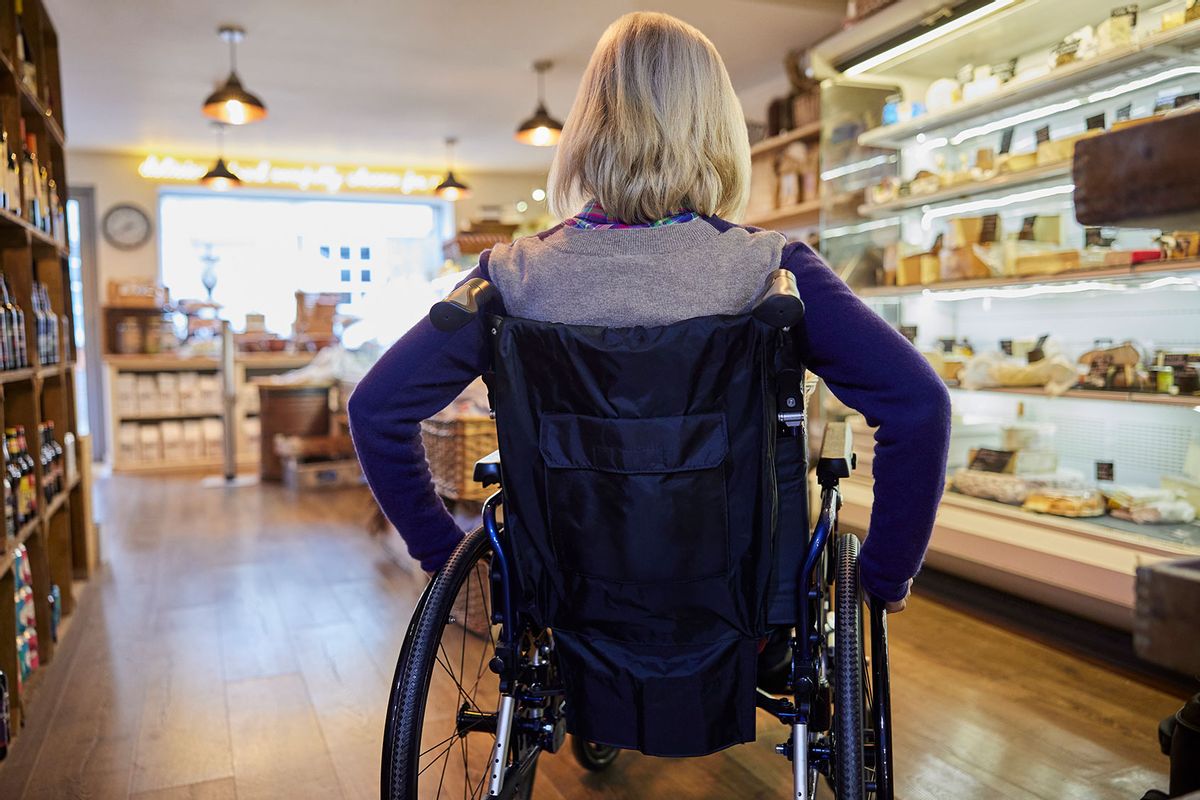A few years ago, I walked up a New York City avenue laden with cloth shopping bags, trying not to cry. As part of a personal study in zero waste living, I had taken the subway, then a bus, and then journeyed on foot a few blocks to one of the few uptown stores selling bulk produce, pantry items and cleaning products. With reused plastic containers full to the brim, I now struggled to get everything back home.
"I'm in pain," describes Hana C., an ICU nurse disabled by several autoimmune conditions in the southwest. "I can't go to the farmers' market, buy organic kale and garlic, and make dinner. It's not that I don't want to. I just can't."
Like Hana, I'm disabled by chronic illness. Like Hana, I consider myself an environmentalist. I hadn't anticipated that a dedicated study of zero waste living would heighten the difficulties of eating sustainably while disabled. But blending homemade almond milk during a migraine and lugging bulk items fifty blocks home proved hazardous to my health.
Services like grocery and meal delivery are generally not environmentally or worker-friendly, using lots of single-use plastic and relying on underpaid gig workers. But they're often the safest and most accessible avenues for disabled and chronically ill people. "I am forced to focus almost entirely on my survival because community care options are so limited and inaccessible in our society," says Lisa Trainor, a neurodivergent and chronically ill writer in Princeton, New Jersey. "Sometimes that means putting my environmental goals on the back burner, which I feel terrible about. But I'm not in a place to think about that over my own needs.
Financial inaccessibility
Disabled people are more than twice as likely to live in poverty as non-disabled people. This makes them less likely to be able to afford the increased costs of local foods. And puts them at greater odds of living in under-resourced neighborhoods with limited access to local and sustainable markets and services like curbside recycling.
"It's nice to say, 'You should do a weekly shop and get everything you need,'" says disabled writer s.e. Smith. "But how am I going to do that in a power chair when the closest bus stop is five blocks away, and I can only deal with two bags of groceries at once? Also, my Social Security doesn't come in until next week, and I have five dollars, and the bus fare is four dollars. There's a lack of understanding about disability-specific barriers to what people think of as common sense food sustainability things."
Physical inaccessibility
Farmers' markets often prioritize social interactions that create adverse barriers for those with disabilities. They're frequently located in recreational areas not easily traversable for mobility aids users, and interacting with multiple vendors requires constant cognitive processing and can increase viral exposure for the immunocompromised. And community recycling or composting programs may not be accessible for those who cannot physically collect, transfer and dispose of such products regularly.
Energetic inaccessibility
Many people disabled by chronic illness live with consistently limited energy. "Buying in bulk and locally is the dream, but that takes extra cognitive and physical energy," says Claire Huntley, an Australian yoga teacher with Myalgic Encephalomyelitis. "They can involve extra planning, sourcing, decisions, calculations, budgeting, ordering, carrying, storing and decanting —compared to making one grocery order a week and selecting from what is available."
Cooking with bagged produce requires less energy than cleaning and slicing individual items. Tossing food scraps in the trash takes less effort than bagging compostable items for a weekly trip to the transfer station. "I have been trying to accept that I can use paper plates or other single-use items without feeling guilty," adds Abby*, a person in Connecticut with multiple chronic illnesses who is unable to housekeep when sick in bed for days on end.
How to battle eco-ableism
Disabled people are often blamed for utilizing unsustainable food systems that help them stay alive. Take the straw ban, which notoriously pitted those who need bendable, disposable plastic straws to safely eat and drink against those who view straws as a wasteful convenience item. Or when a New York City Whole Foods announced a new produce butchering service where customers could have their produce chopped to their specifications and packaged in their personal reusable containers and media backlash summarized potential users as spoiled, lazy or lacking "the basic skills necessary to function as independent human beings." "Many people dunked on it extensively," Smith remembers of them not recognizing how this service would reduce reliance on set amounts of prepared produce sold in single-use plastic packaging. "And I was like, 'This is awesome! I would totally use this because I could get produce prepared and packaged in something more sustainable.'"
"Personal responsibility for climate change is insufficient to address the crisis. Period," says Eliza Orlins, a New York-based public defender with ADHD, of how many disabled people feel blamed by non-disabled eco-conscious friends for their reliance on unsustainable systems when true impact can only be made on a much larger scale. Still, there are many ways non-disabled individuals can help create more accessible, sustainable food systems for disabled individuals and communities — right now.
Decrease the financial gap
Many disabled people navigate both decreased income and heightened medical expenses. But where many food programs offer discounts to seniors, few do the same for disabled people who could become regular consumers of local goods and contributors to sustainability conversations if offered a little financial aid. On an individual level, non-disabled people can offer to add a disabled friend to your membership or discount program so that they can utilize otherwise unaffordable services.
Create accessible local food spaces
Remember when grocery stores offered dedicated hours to seniors at the top of the pandemic? This decreased potential virus exposure, eased physical mobility, reduced stimulation and minimized idle time.
Local food venues, like farmers' markets, could have a designated time regularly implemented for disabled people and address where mobility aid users might struggle to navigate or if a little less sound or light stimulation might better welcome those with sensory disorders. Online ordering and curbside pickup programs would help save disabled people energy and physical effort. And articulating accessibility options on marketing materials would ensure that disabled people know they can utilize these services.
Help with mealtime
Many people cook using single-use containers of prepared produce, accepting increased packaging waste as the cost of time and energy saved. But for those with persistent fatigue, pain and mobility disabilities, such items are not a convenience but a necessity. "Sometimes having easily accessible foods makes the difference between me eating somewhat healthfully, getting expensive fast food delivered, or eating at all," says Leslie Kay Stratton, a Central Kentucky-based graduate student with several chronic illnesses.
Friends and community members can help meet this need by offering to assist with weekly meal planning and preparation. You could clean, prepare and package ingredients in reusable containers, then ask where to store them so that they'll be most easily accessed: Several people with ADHD shared that they're most likely to use items stored in their line of vision while those in produce drawers tend to be forgotten and rot. If you're financially able, consider offering to pay for a private chef or cleaning service for a friend or family member that can regularly help reduce their physical load of cooking and cleaning.
The most important thing is to ask someone first what would best meet their needs. Don't show up unannounced with prepped items you presume someone can or wants to eat. "You've now passed the need to sort and possibly throw food away onto someone already struggling," says Rook Stone, a chronically ill disabled writer in California's Central Valley. "There's guilt on top of it because you want to be grateful, but now that's hard."
Communal shopping
Disabled and chronically ill people have suffered disproportionately during the Covid-19 pandemic. But the increase in the number of grocery delivery services and the lower prices, thanks to competition, has made food shopping safer and more affordable for those always looking to cut back on energy expenditure. More establishments now accept EBT. And some deliver within short time windows, too. "This is great for when I forget an ingredient for something I want to make or simply forget to buy food," adds Orlins of meal food shopping with ADHD.
To help decrease the packaging and transportation costs inherent in such services, friends and neighbors can pool delivery orders. Consider offering to fill a disabled friend or neighbor's grocery list every time you head to a local market. And buy bulk items together to save money.
Broaden transportation services
Farm stores and co-ops should consider making one daily delivery to local disabled people. Or CSAs can offer flexible pickup options, as does Ohio's Yellowbird Foodshed: "If you're late for your usual spot, you can get it at the next location," says Jen Radomski, the chronically ill and disabled co-founder of Ohio's Wild Prairie Flower Farm, of Yellowbird offers five pickup locations. "I can get fresh, seasonal, local food without expending precious limited energy thinking about it, which allows me to prioritize my nutrition even on my worst days."
Individuals can offer to carpool to farmers' markets or local fairs. And organizations can create programs where volunteers pick up or drop off items to disabled people in their neighborhoods.
"I can't personally compost," says Hana C., the ICU nurse. "But if someone came by and grabbed my food waste for a community-based compost effort, I'd be happy to collect it separately."
Push for systemic change
Assisting disabled friends and loved ones can make an immediate positive impact on their quality of life and help to deepen their environmental commitment. But for greater ripple effects, look to where you can help transform businesses within your local foodshed to make them more easily accessible to all. Offer to help coordinate volunteer programs across community outreach and operations that increase access for all area residents. If hygiene or other regulations challenge a food businesses' sustainability efforts, bring creative and effective solutions to your local officials. And if you can connect dots between a sustainability issue and a solution — say, stores in your area might contribute to a composting program if offered —discuss with others in your community how to make such a program possible.
"In a lot of conversations about disability and sustainability, all of the burden is put on individuals [with disabilities]," says Smith. "A whole society exists. So you need to build your networks. You need to make sure that those networks are diverse. And you need to make sure that you are talking to people to see whether you are proposing is what they actually want or need."
*Not her real name




Shares